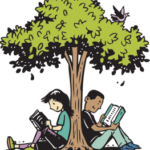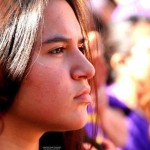Passionate, loving, open
Sofia Campos
b. 1989, Peru
Heading up the “United we Dream” network of youth-led immigrant organizations is a very personal act of love for this organizer, teacher, student, writer, and dancer who looks in every way to lead by example.
1. What three words describe your leadership style?
Passionate, loving, open
2. What are you best at?
I am a good active listener. I have learned it is so important. Organizing is all about building relationships. I am open and intentional about showing love, and really hearing people’s genuine intentions. I am articulate – I noticed this early on. This is how I started to organize, by giving speeches. Jimi Hendrix said, “Knowledge speaks but wisdom listens.” This quote has really stuck with me and I want to be able to have this balance of really listening along with speaking.
3. What is the most important thing you do?
To love is the first thing that comes to mind. I really believe in a movement that has love at the core. I believe our movement is a family. Everything I do is founded on love. I really try to be intentional about this. How do you sustain relationships at a national level, across state borders and on conference calls? It can be very difficult. That makes it that much more important to be intentional about where you are coming from and where you are trying to go. The best thing I can do is to take that love with me. In order to sustain this I need to have self-love.
4. What do you know to be true about leadership?
It takes an open mind, an open heart, and an open hand. Something we try to pass on to young organizers is to balance thinking (mind) and feeling (heart), and I added hand because you need to be able to show it, to live it. Also with that open hand you need to get to work yourself and this sometimes also means following. To be a leader you have to know how to follow as well, and this is very important, because we are trying to build sustainable leadership so leaders need to cycle in and out. We are trying to build a social justice movement for a better world and no one can do this alone. This is what I have learned from others, and for myself through experience. I think the adjective “open” is key; you have to know how to communicate. This is true at the local, state, and national level-you need to be open and have transparent work that people can follow.
5. What is your earliest memory of injustice?
I’ll share the biggest one that comes to mind, where I had a “damn that sucks moment.” My family came to the United States in 1996 when I was 6 years old. We are immigrants and we lived with my Aunt, and we had to do a lot of jobs to get by. I remember working in a newspaper plant, and it was like a movie. When I was a kid I thought it was kind of play, we would put adds inside of newspapers, and I would run around and get rides on the dollies. Later on I realized the nature of this work and all the other difficult work that my parents and cousins had to do, for so little money. While at the time I had fun, later I knew how much my family sacrificed for my future.
6. What traits do you possess that are typical for your family?
My Mom is a very passionate and articulate person. She is a powerhouse. She got this from my Grandmother in Peru who I have not known growing up. My Dad and brother are both very intelligent, careful-minded people who have a great curiosity and thirst for knowledge. My sister has a positive energy that is open, sincere and easy going. I try to be down to earth. I think I draw from all of these family traits. I am privileged to have my family around me. This is not always true, especially for immigrants. This work is very personal, so it helps to know that my family has my back and I have theirs no matter what.
7. What accomplishment are you most proud of?
This past summer I led a “Freedom School Summer Program” for High School students at the Miguel Contreras Learning Complex in Los Angeles, California in partnership with the Miguel Contreras foundation, the Children’s Defense Fund, and the UCLA Labor Center. This was the first of its kind in that it implemented an organizing curriculum for low income, public school youth in this age group. We touched the lives of 20 High School Students and a good percentage of the youth or their families were undocumented. It was very personal and empowering. It was based on non-traditional popular education methods, organizing tools, and exploring our immigrant identities. We modeled our leadership, and they saw themselves in us which meant they saw their own leadership. It was an amazing way to conclude my work at the Labor Center and prepare for heading to MIT.
8. What are you afraid of?
I know what it’s like to feel lost. Feeling that you are voiceless is a really dark place to be. I fear people won’t find the movement when they need it. That they will fall without gaining the support to rise again. Seeing so many injustices around us drives me to do this work even more passionately. I want to expand, not as an organization, but as a movement that can catch people when they fall, that can literally help people save themselves and each other.
I don’t dwell on this often, but I do have a fear of losing my family. My parents don’t have papers, and myself and my siblings - we only have deferred action. There are days where I may feel a little doubt or source of darkness in the back of my mind because of this. Deportations and family separation happen every day, and it could be any one of us. This helps fuel my fight – I try to turn this difficult truth into a source of strength
9. What is the last thing that made you really angry?
The week before Christmas one of the mothers of two youth leaders in the group “Scholarship A-Z” in Tucson, Arizona was stopped while driving. She was found to not have license, put in a holding cell and then transferred to a detention center. Another mother from this same group had been stopped and detained the previous week, so this was the second mother separated from her family over the holiday season.
10. If you could change one thing about yourself, what would it be?
I believe we’re all works in progress-always learning and growing. And more often than not, the best way to learn is to make mistakes and take risks. I used to want to be taller. Now sometimes when I speak, I tell people I’m going to try to keep my remarks short and fierce, just like me. And I mean it. Everything I am is a result of my lived experiences and where I come from, and I wouldn’t change either.
11. What do you do for fun?
I love to dance. For me this is also a tool for healing - to release my spirit and to be and feel free. I’ll dance anywhere! I like to paint and journal too. I enjoy writing, and I’ve done spoken word and would like to do more of this. And laughing, of course. I laugh a lot with friends. That can also be a healing tool.
12. What is the best advice you ever got?
“Step by step.” My parents said this to me when I found out I was undocumented. I was seventeen and we had no idea how we’d pay for my college tuition as a low income family without access to any financial aid. This advice has grounded me in many times of uncertainty. Step by step, quarter by quarter I graduated from UCLA and step by step, person by person we’re building this movement and making real change.
13. What failure or success taught you the most?
Failing at having a normal college experience was a huge blessing in disguise. In high school, before I knew I was undocumented, I thought of college as my opportunity to study abroad and something I was just supposed to do. Being an undocumented student forced me to have a non-traditional education and that experience taught me so much. Taking time off to raise enough money for the next academic term; having a 2 hour commute from home to UCLA because I couldn’t obtain a driver’s license; relying on myself, my family, and my community of peers for support and strength to not only survive but succeed-all of these experiences I took away with me and because of them, every mistake and success I accomplished became all that more meaningful. Learning how to struggle was an invaluable experience.
14. How would you like to be remembered?
I want to have passion for everything I do. I want to love, love, love the world and the work. I want to be open. I believe in genuinely being myself and allowing others to be themselves. I used those qualities to describe my leadership style because I try to model them as best I can, but I know I have to keep at it to really embody them. If we have open love and freedom at the core of our movement then we can reach something bigger than we have now, something more just, more beautiful and more whole. I want to ground myself in this truth and do my part in spreading this energy in our world.
15. Anything else?
For me, movement is family. I think there are a lot of people out there in search of comfort and support, which is why it is important to me to grow family. Joining the movement saved me in ways I did not think was possible. They, IDEAS, taught me what it can mean to be undocumented, and how we can make the most of it. That we are our own best advocates.
Comments
One Response to “Passionate, loving, open”
Leave a Reply


A remarkable young woman! How can we help other young women, who have neither the parental wisdom, nor the challenges that Sophia has had to see a role for themselves in the movement for justice?